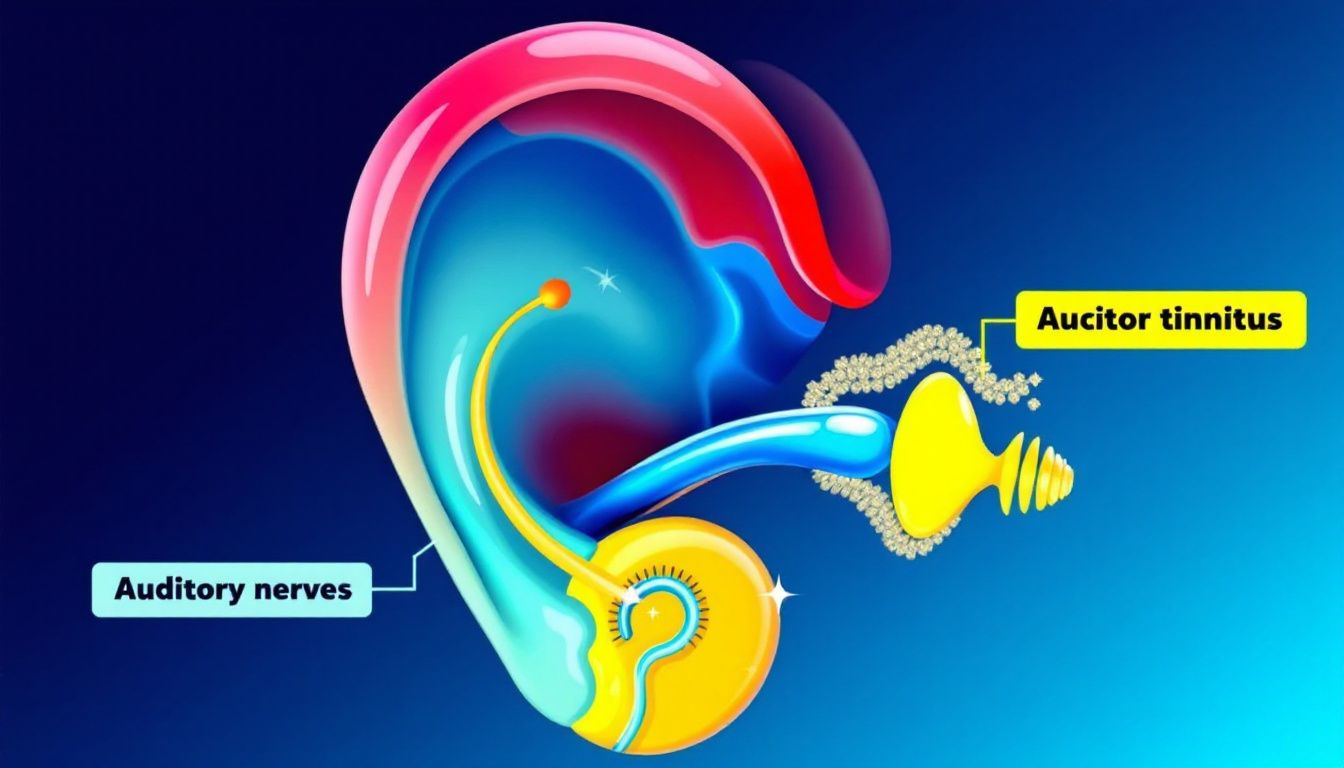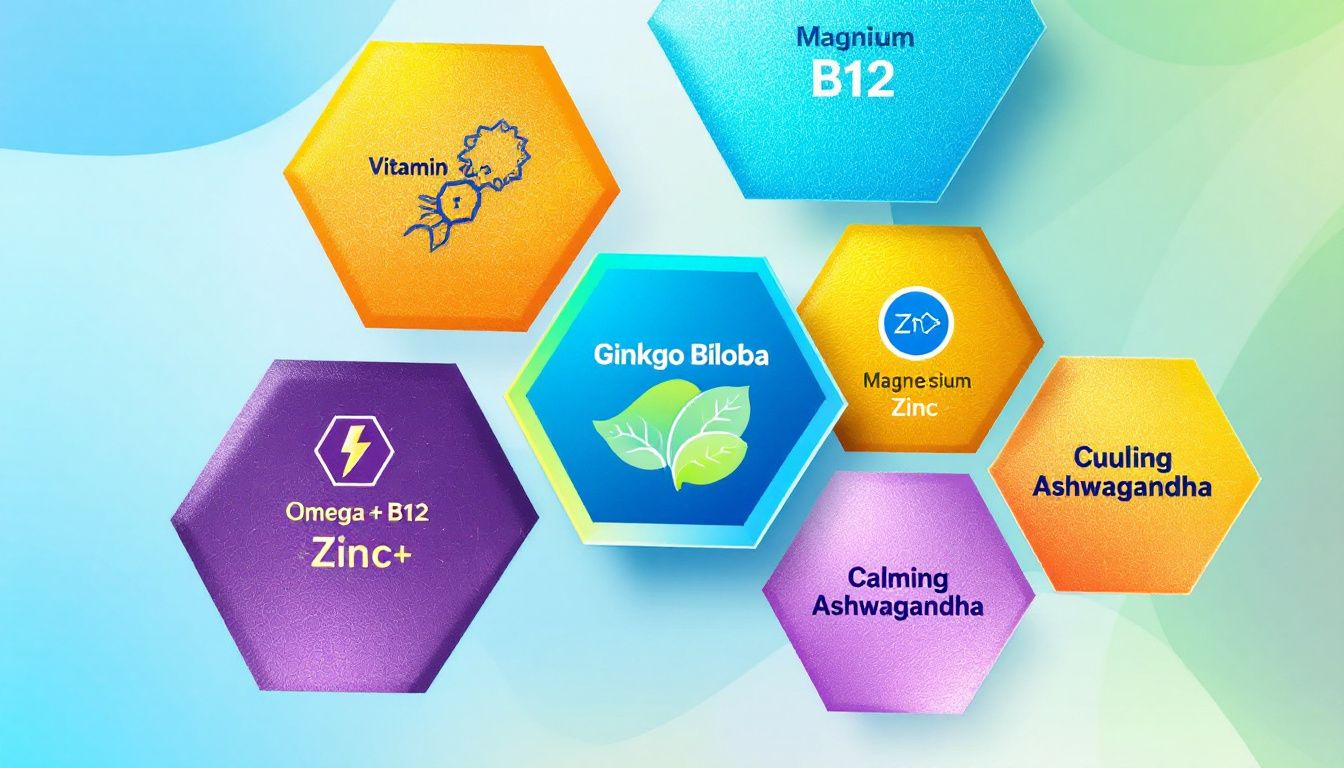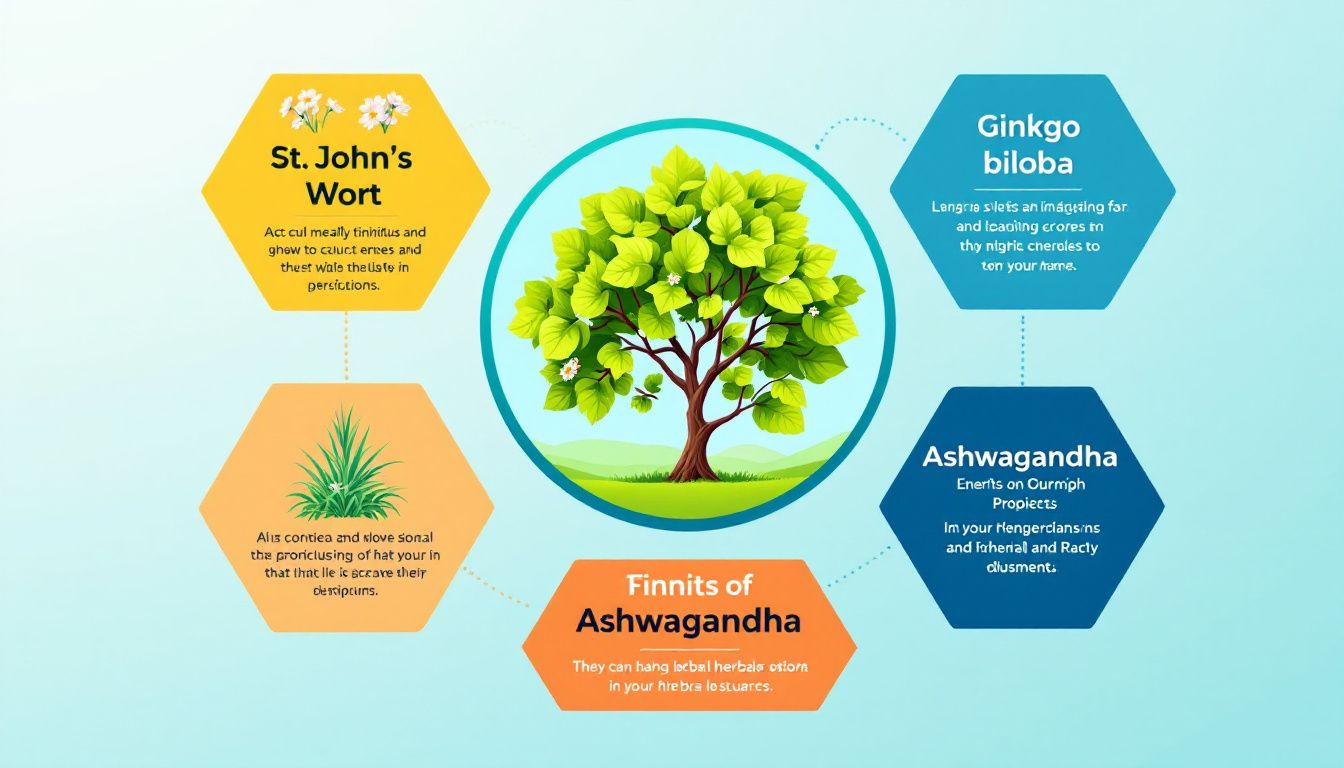Tinnitus, the persistent ringing, buzzing, or hissing in the ears, affects approximately 15% of the adult population, disrupting daily life and often leading to anxiety and stress. While there isn’t a magic pill to completely cure tinnitus, there is hope in understanding the underlying causes and exploring various treatment options. Finding the best supplement for tinnitus has gained attention for those searching for solutions, with options like Ginkgo Biloba, zinc, and magnesium emerging as promising contenders. But how effective are these dietary supplements, and what should you consider before adding them to your treatment plan?
This article covers the potential benefits and risks of taking supplements for tinnitus, emphasizing the need for professional guidance. Beyond supplements, we'll explore alternative treatments such as sound therapy, stress management techniques, and traditional Chinese medicine—approaches that may complement your journey toward tinnitus management. Whether you're experiencing age-related hearing loss, noise-induced hearing loss, or subjective tinnitus, understanding the role of lifestyle changes and other treatment options could be the key to reducing tinnitus symptoms and improving your overall well-being.
Key Takeaways
- Tinnitus affects approximately 15% of adults and can lead to significant quality of life issues, emphasizing the need to understand its underlying causes for effective management.
- Popular supplements for tinnitus include Ginkgo Biloba, zinc, and magnesium, but their efficacy is still under investigation, with potential side effects necessitating professional consultation before use.
- Alternative treatments and lifestyle changes, such as Tinnitus Retraining Therapy, cognitive-behavioral therapy, and stress management techniques, can relieve and improve tinnitus patients' overall well-being.
Understanding Tinnitus

Tinnitus is characterized by the perception of sound without any external stimulus, often described as ringing, buzzing, or hissing in the ears. For many, this condition can significantly diminish the quality of life, leading to difficulties in concentration and sleep. Imagine trying to focus on a task or drift off to sleep while your ears are constantly filled with an unrelenting noise. This is the daily reality for many tinnitus patients experiencing subjective tinnitus.
The prevalence of tinnitus is relatively high, with estimates suggesting that nearly 15% of the adult population experiences some degree of this condition. The impact of tinnitus can vary from person to person, with some experiencing only a mild annoyance. In contrast, others suffer from persistent bothersome tinnitus that disrupts their daily activities and overall well-being. In severe cases, tinnitus can lead to anxiety and depression, further complicating the lives of those affected.
Understanding the underlying causes of tinnitus is crucial for effective management. Tinnitus can result from various factors, including noise-induced hearing loss, age-related hearing loss, and even certain medical conditions affecting the inner ear. By identifying the root cause, healthcare professionals can tailor a treatment plan that addresses the specific needs of each individual, aiming to reduce tinnitus symptoms and improve their quality of life.
Popular Supplements for Tinnitus

Regarding managing tinnitus, dietary supplements have gained attention for their potential benefits. Popular options include Ginkgo Biloba, zinc, and magnesium, each with its purported benefits.
However, it’s essential to consult a healthcare professional before starting any dietary supplement, as there can be potential side effects and interactions with other medications. Taking nutritional supplements can be explored in more detail.
Ginkgo Biloba
Ginkgo Biloba is among the most researched dietary supplements. It is commonly used for treating tinnitus. This herbal medicine is believed to improve blood circulation in the inner ear and brain, potentially alleviating tinnitus symptoms. Some studies have shown that Ginkgo Biloba extract can reduce tinnitus severity in dementia patients, although the overall effectiveness of Ginkgo Biloba from clinical trials has produced conflicting results. This inconsistency underscores the need for further research to establish its efficacy in treating tinnitus.
Despite mixed results, Ginkgo Biloba remains popular for those seeking alternative treatments for tinnitus. Its potential to improve cerebral blood circulation and protect against free radicals makes it a subject of ongoing research.
Until more rigorously conducted clinical trials focusing on tinnitus are available, the true effectiveness of Ginkgo Biloba remains uncertain.
Zinc
Zinc deficiency has been linked to both tinnitus and hearing loss, making it a potential target for treatment in managing these conditions. Zinc plays an essential role in supporting the health of sensory organs, including the inner ear, and addressing a deficiency may help reduce tinnitus symptoms and improve hearing loss. While zinc supplementation shows promise, it’s vital to consult a healthcare provider to determine the correct dosage and avoid potential adverse effects, such as interactions with other medications or excessive intake.
For those considering zinc supplementation, our article, “The Health Enthusiast's Dream: Five Of The Best Zinc Selenium Supplements You Need to Know,” provides a detailed review of the top options available on Amazon. These supplements are carefully selected to ensure quality and effectiveness, saving readers time when finding trusted products. Zinc's ability to combat zinc deficiency and support healthy blood flow to the inner ear may explain its role in relieving tinnitus symptoms, particularly in individuals whose tinnitus stems from nutritional deficiencies. Incorporating zinc into a comprehensive treatment plan could be valuable in managing tinnitus and improving overall ear health.
Magnesium
Magnesium is another mineral supplement that garnered attention for its potential benefits in tinnitus management. This essential mineral supports inner ear function and may help prevent tinnitus caused by noise exposure. Low magnesium levels in the body have been associated with worsening tinnitus symptoms, making magnesium supplementation a potential solution for some individuals.
For those considering magnesium supplements, our article, “Magnesium Marvels: Discover the Five Best Magnesium Bisglycinate Chelate Supplements for Your Wellbeing,” offers a comprehensive review of the top options available on Amazon. These expertly chosen products highlight the best quality and effectiveness, saving readers valuable time in their search. Magnesium not only supports the sensory organs in the inner ear but also promotes overall ear health, potentially helping to restore function in those who are deficient. Before adding magnesium to your treatment plan, please consult a healthcare professional to ensure it aligns with your health needs and avoids interactions with other medications.
Herbal Medicines for Tinnitus

Herbal medicines have been explored as potential treatments for tinnitus, with various options available for those seeking alternative medicine. However, evidence supporting these remedies' effectiveness is insufficient, with conflicting conclusions from existing studies.
Despite these limitations, some herbal medicines promise to manage tinnitus symptoms and may lead to a treat tinnitus cure.
Açaí
Açaí, a fruit known for its antioxidant properties, has been suggested to help reduce tinnitus symptoms. Preliminary studies indicate that Açaí may offer potential health benefits, including lowering anxiety levels, which can benefit overall mental health. For those struggling with the cognitive burden of tinnitus, reducing anxiety can be an essential aspect of managing their condition.
However, the evidence supporting Açaí for tinnitus is still preliminary, necessitating more clinical research to determine its effects on tinnitus and anxiety conclusively. While its antioxidant properties are promising, tinnitus patients should approach this herbal medicine with cautious optimism until more robust evidence is available.
Korean Red Ginseng
Korean Red Ginseng, a revered component of traditional Chinese medicine, has been explored for its potential role in tinnitus management. Known for its protective effects on auditory health, this herbal remedy may help improve overall well-being, which is essential for individuals navigating the challenges of tinnitus. Its ability to foster a sense of balance and vitality could make it a valuable addition to a holistic treatment plan, particularly for those seeking natural solutions.
If you’re curious about incorporating ginseng into your routine, our article, “The Best Ginseng Supplements For Peak Performance,” is a must-read. It highlights five top-rated ginseng supplements available on Amazon, saving you the time and effort of finding high-quality options. While Korean Red Ginseng shows promise, research into its effectiveness for managing tinnitus symptoms remains. Until more evidence emerges, it’s best used as part of a broader strategy that includes lifestyle changes, professional guidance, and other treatment options tailored to your needs.
Gushen Pian
Gushen Pian, an herbal medicine traditionally used in Chinese medicine, has been shown to support kidney function and enhance blood circulation. These benefits may indirectly help tinnitus patients by improving overall health and well-being. Clinical research on Gushen Pian highlights its effectiveness in enhancing kidney performance and circulation, potentially benefiting those with tinnitus.
A robust multicenter randomized controlled clinical trial involving larger populations for Gushen Pian is still lacking, indicating a need for further research. Tinnitus patients should approach Gushen Pian with cautious optimism and consult healthcare professionals before starting any new treatment.
Risks and Considerations
Before starting any tinnitus supplements, consulting a healthcare professional tailors recommendations to specific needs. High doses of zinc may lead to adverse effects, so ensuring the correct dosage and avoiding potential interactions with other medications is essential. Similarly, magnesium interacts with certain medications, underscoring the importance of discussing its use with a healthcare provider.
Substance use, particularly caffeine, alcohol, and nicotine, can negatively affect tinnitus symptoms and should be managed carefully. Research shows dietary supplements are generally ineffective for managing tinnitus symptoms, emphasizing the need for a comprehensive treatment approach. Additionally, no substantial evidence supports zinc supplementation as a definitive treatment for tinnitus.
Be cautious of misleading claims on the internet regarding supplements for tinnitus. No drugs have been approved for tinnitus treatment, indicating ineffective medicinal solutions. Consulting healthcare professionals and relying on evidence-based therapies are crucial for effective tinnitus management.
Alternative Treatments for Tinnitus

Tinnitus often occurs alongside other conditions, such as hearing loss, anxiety, and depression. Tinnitus Retraining Therapy (TRT) is one of the most effective alternative treatments, combining counseling and sound therapy to help individuals habituate to their tinnitus sounds. During TRT, sound therapy uses devices that play masking sounds to reduce the awareness of tinnitus, making it easier for patients to cope with the condition.
Hearing aids can also play a significant role in managing tinnitus symptoms. By amplifying external sounds, hearing aids make tinnitus less perceptible, relieving those with hearing loss. Sound masking devices, which produce white noise or other sounds to overshadow tinnitus, are available in various formats and can effectively reduce the perception of tinnitus.
Cognitive-behavioral therapy (CBT) can help individuals reframe negative thoughts about tinnitus and enhance their coping strategies. Maintaining social interactions and engaging in enjoyable activities can help distract from tinnitus and improve emotional well-being.
Recent clinical trials, such as the TENT-A1, TENT-A2, and TENT-A3 studies, prove that bimodal neuromodulation may help alleviate chronic tinnitus symptoms. Innovative treatments like neuromodulation, which combine auditory stimuli and electrical nerve stimulation, show promise in retraining the brain to ignore tinnitus sounds. The FDA’s approval of the first noninvasive neuromodulation device for tinnitus in March 2023 marks a significant advancement in treatment options.
Lifestyle Changes and Management
Managing stress is key to alleviating tinnitus symptoms, as stress can exacerbate the condition. Incorporating relaxation techniques like deep breathing and meditation helps reduce stress and tinnitus perception. Regular physical exercise is also associated with lower stress levels and can improve the quality of life for those with tinnitus.
Implementing good sleep hygiene practices helps mitigate the impact of tinnitus, assisting individuals to sleep better despite the condition. Staying adequately hydrated is essential, as dehydration can worsen tinnitus symptoms and related health issues. Additionally, avoiding exposure to loud noises is critical in preventing further hearing damage that could exacerbate tinnitus.
Cognitive-behavioral therapy (CBT) may not lower tinnitus loudness but can enhance overall well-being. Adopting these lifestyle changes helps individuals better manage their tinnitus and improve overall health.
Current Research and Future Directions
Conflicting evidence exists regarding the effectiveness of herbal remedies for tinnitus, necessitating further research to establish their actual benefits. For example, Korean Red Ginseng has shown potential improvements in tinnitus symptoms and overall quality of life in patients undergoing treatment. However, more high-quality multicenter randomized controlled trials are needed to understand better the effects of herbal medicines like Gushen Pian on tinnitus patients.
Recent research focuses on neuromodulation as a new tinnitus treatment, aiming to retrain the brain to ignore tinnitus sounds. Techniques such as deep brain and spinal stimulation are being investigated for their potential in treating tinnitus.
While transcranial magnetic stimulation has shown mixed results, ongoing research continues to explore its effectiveness for tinnitus.
Wrapping Up
Tinnitus, a condition that affects roughly 15% of the adult population, can significantly impact daily life. Searching for effective treatment options is essential. As individuals seek relief, many turn to dietary supplements, herbal medicines, and vitamins to address potential deficiencies and support their overall health. Promising options like Ginkgo Biloba, zinc, magnesium, and traditional Chinese medicine remedies, such as Korean Red Ginseng, offer potential benefits for reducing tinnitus symptoms and improving inner ear health. However, while these studied dietary supplements may help some individuals, consulting a healthcare provider ensures safe and appropriate use, especially for those with existing health conditions or those taking other medications.
A holistic approach to tinnitus management involves more than just taking supplements. Combining natural remedies with alternative treatments such as sound therapy, Tinnitus Retraining Therapy, and hearing aids can provide a well-rounded treatment plan tailored to individual needs. Lifestyle adjustments, such as managing stress, avoiding loud noises, and incorporating relaxation techniques, are equally vital in managing tinnitus and improving overall well-being. As ongoing research uncovers innovative methods like neuromodulation, there is growing hope for more effective solutions to cure tinnitus or mitigate its effects. By staying informed, embracing lifestyle changes, and exploring various treatment options, individuals can take meaningful steps toward a better quality of life while navigating the challenges of this complex medical condition.
Brief Answers to FAQs
Can zinc supplements cure tinnitus?
Zinc supplements may alleviate tinnitus symptoms for those with a deficiency but are not a cure. Consultation with a healthcare professional is advisable before starting any supplementation.
Are there any risks associated with taking dietary supplements for tinnitus?
There are risks associated with taking dietary supplements for tinnitus, including potential adverse effects from high doses of zinc and magnesium and interactions with other medications. It is essential to consult a healthcare professional before starting any new supplement regimen.
How effective is Ginkgo Biloba in treating tinnitus?
Ginkgo Biloba's effectiveness in treating tinnitus remains inconclusive, as clinical trials show conflicting results. Further research is necessary to determine its true efficacy.
What lifestyle changes can help manage tinnitus?
Adopting lifestyle changes such as practicing relaxation techniques, regular exercise, ensuring good sleep hygiene, staying hydrated, and avoiding loud noises are essential to manage tinnitus effectively. These measures can significantly alleviate the impact of tinnitus on daily life.
What are some alternative treatments for tinnitus?
Tinnitus Retraining Therapy (TRT), hearing aids, sound masking devices, cognitive-behavioral therapy (CBT), and neuromodulation are effective alternative treatments for tinnitus. These methods focus on alleviating symptoms and enhancing the overall quality of life for individuals experiencing this condition.
Thanks for taking this journey to explore the best supplement for Tinnitus. If you want to add to your library of knowledge and are interested in diving deeper into some of the supplements mentioned in this article, you should check out the links above. It could be a huge time-saver - you won't be sorry you took a look.
Also, please return soon to check out our next review of other incredible supplements – we’re always looking out for YOU!
*We are NOT qualified medical advisors. The content here is only based on our personal opinions and research and should NOT be used as a substitute for a healthcare professional's advice!











Member discussion